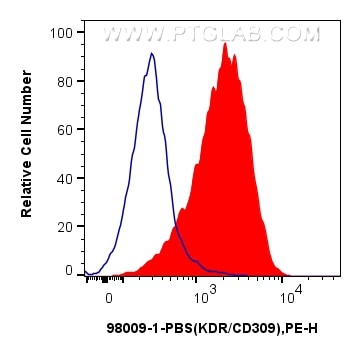Tested Applications
| Positive FC detected in | HUVEC cells |
Recommended dilution
| Application | Dilution |
|---|---|
| This reagent has been tested for flow cytometric analysis. It is recommended that this reagent should be titrated in each testing system to obtain optimal results. | |
Product Information
98009-1-PBS targets VEGFR2/CD309 in FC applications and shows reactivity with human samples.
| Tested Reactivity | human |
| Host / Isotype | Rabbit / IgG |
| Class | Recombinant |
| Type | Antibody |
| Immunogen | Recombinant protein Predict reactive species |
| Full Name | kinase insert domain receptor (a type III receptor tyrosine kinase) |
| Calculated Molecular Weight | 152kd |
| GenBank Accession Number | NM_002253 |
| Gene Symbol | KDR |
| Gene ID (NCBI) | 3791 |
| Conjugate | Unconjugated |
| Form | Liquid |
| Purification Method | Protein A purification |
| UNIPROT ID | P35968-1 |
| Storage Buffer | PBS only , pH 7.3 |
| Storage Conditions | Store at -80°C. Stable for one year after shipment. |
Background Information
VEGFR2, also named as CD309, KDR and FLK1, is a receptor for VEGF or VEGFC. VEGFR2 which belongs to the protein kinase superfamily, has a tyrosine-protein kinase activity. The VEGF-kinase ligand/receptor signaling system plays a key role in vascular development and regulation of vascular permeability. In case of HIV-1 infection, the interaction with extracellular viral Tat protein seems to enhance angiogenesis in Kaposi's sarcoma lesions. VEGFR2 functions as the main mediator of VEGF-induced endothelial proliferation, survival, migration, tubular morphogenesis and sprouting. Mutations of this gene are implicated in infantile capillary hemangiomas.
Protocols
| Product Specific Protocols | |
|---|---|
| FC protocol for VEGFR2/CD309 antibody 98009-1-PBS | Download protocol |
| Standard Protocols | |
|---|---|
| Click here to view our Standard Protocols |



